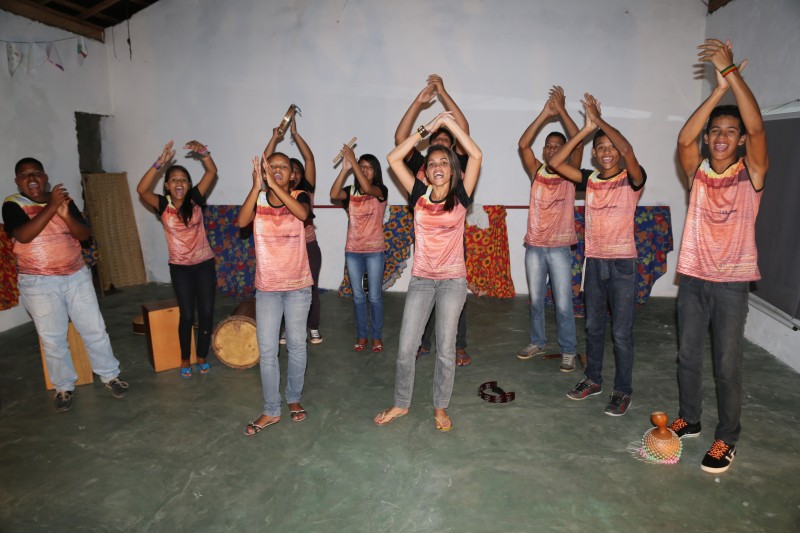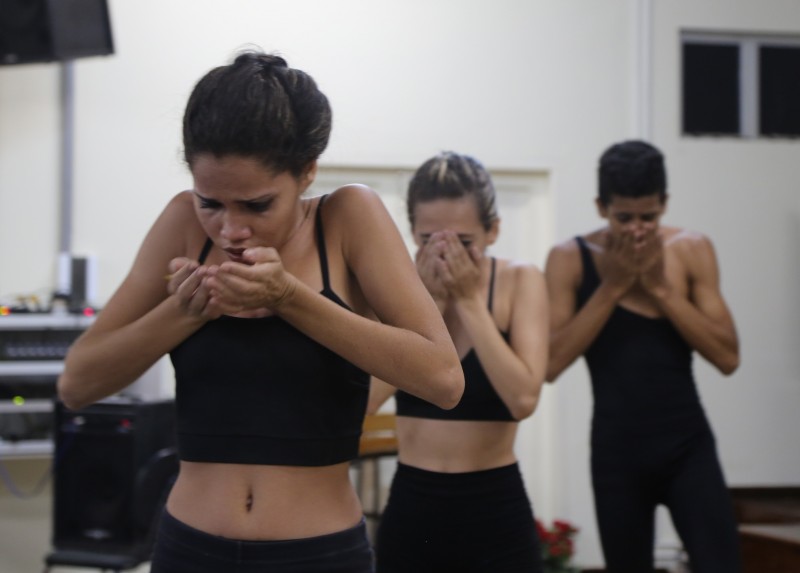
Sandoval Maia, Évany Valente, Elisa Dias, Caroline Valente, Carol Sousa, Matheus Sá, Camylla Alves, Rafael Varão, Pablo Diego e João Paulo Sousa, together in the Barracão da Cultura (Culture Barn) of Rios de Encontro. Photo: Rios de Encontro/Communication
In a small town near the Carajá Mountains, in the same Brazilian Amazon region where the largest mines of quality iron are still found, young people from the collective Rios de Encontro are promoting art as a way to preserve their local riverside culture. Global Voices went on a visit to Cabelo Seco, a community situated in Marabá, a town in the state of Pará, where they work, to find out about their efforts.
The collective, set up by the arts educator and cultural manager Manoela Souza and writer and fine artist Dan Baron, has 14 micro-projects underway, all of which encourage the idea that development does not necessarily have to mean destroying the local rivers and forests.
Amongst the projects are Latinhas de Quintal (Backyard Little Cans), winner of the UNICEF national prize of 2011, and the dance group AfroMundi, winner of the 2012 national prize Jovem Agente de Cultura (Young Culture Agent) awarded by the Ministry of Culture. Together, the two projects also won the 2014 prize awarded yearly by Creative Connections, an international cultural education organization, for their album “Amazônia Nossa Terra” and their dance performance Lágrimas Secas (Dry Tears):
The group traveled to New York in April to perform Lágrimas Secas. With the support of co-founder Dan Baron, 19-year-old dance company leader Camylla Alves created the choreography. She told Global Voices:
O projeto mostrou isso, que a gente tem a capacidade de sonhar e realizar nossos sonhos. A gente pode dançar, cantar, ser livre. Lágrimas Secas dramatiza os grandes rios do mundo secando e pegando fogo depois da construção das hidrelétricas e assassinatos das nascentes.
The project has shown us that we have the capacity for dreaming and making our dreams come true. That we can dance, sing and be free. Lágrimas Secas shows the drama of the big rivers of the world getting dry and in fire after the construction of the hydroelectric plants and the murder of their headwaters.
In her work, Camylla combines music and African choreography with contemporary languages to reflect the history of her people and her own ethnic roots. She was awarded a grant from Rios de Encontro to carry out artistic research, what allows her to support herself.
In a town classified among the ten most violent for young black people in Brazil, Rios de Encontro provide tools to help build self-esteem and confidence among residents there.
Hoje somos uma família, segredos tudo a gente compartilha. A comunidade ainda tem fraquezas, brigas e rixas, muita preocupação em casa e nas ruas, mas a gente tenta passar por cima disso.
Today we see ourselves as one big family, we share secrets and everything. The community still faces weaknesses, fights and disputes, a lot of worries at home and in the streets, but we try to overcome all that.

Camylla Alves, Lorena Melissa and João Paulo Sousa performing in the show Lágrimas Secas/ Photo: Rios de Encontro/Communication
‘Rios de Encontro has made me stronger’
Another project is called Radio Arraia, which won a grant from Rising Voices Amazonia in 2014. The project creates radio jingles to spread the news about the collectives artistic productions and to create a deeper awareness of environmentally friendly practices, such as the use of solar energy. The idea is to oppose official discourse, which favors the construction of hydroelectric plants, and bring sustainable development alternatives to the discussion.
Listen to this jingle inviting people to charge their cell phones in the Rios dos Encontros barn, where a solar plate has been made available:
And this jingle inviting the neighborhood to come to the Lágrimas Secas performance:
The collective's meetings happen in two places within the Cabelo Seco community. Near the riverbanks, where the Rivers Itacaiúnas and Tocantins come together, is the Casinha de Cultura (Culture Home), where their meetings, overseen by adult coordinators Dan and Manoela, take place. There, you can learn about everything that is going on in the neighborhood. “The window is our great communication medium,” Manoela says, laughing.
Fifty metres away is the other meeting point: a barn with covered area, where the collective puts on its artistic productions.
Elisa Dias, 18, and Caroline Valente, 18, also chatted with Global Voices. Elisa is leader of the group Roupas ao Vento (Clothes in the Wind), a project which centers on gender questions, and she is used to advising girls on how to avoid violence at home and in the streets. She tells us how important having Dan and Manoela in her life has been:
Quando engravidei, com 15 anos, recebi muito apoio de Dan e Manoela, o que não recebi em casa. Decidi ficar com o bebê (Pietro). Já estava acostumada a tomar conta dos meus irmãos. Eu cuidava dos meus irmãos enquanto minha mãe ia lavar roupa no rio.
When I got pregnant, at 15, I got a lot of support from Dan and Manoela, something I didn't get at home. I decided to keep the baby (Pietro). I was used to taking care of my siblings. I took care of my brothers while my mother went out to wash clothes down at the river.
Caroline likes to tell stories and has become the social reporter for the project. She even created the project Nem um Pingo (Not even one drop) to register the lives of the local residents:
O Rios de Encontro fortaleceu mais o que quero pra mim. Criei o Nem um Pingo e foi bem legal. A gente filmava, documentava e apresentava para a comunidade toda. Escutava várias histórias diferentes e engraçadas.
Rios de Encontro has made me stronger in terms of the decisions I make for myself. I created the project Nem um Pingo and it was cool. We filmed, documented and presented to the whole community. We had the chance to listen to many different and funny stories.
The two have been with Rios de Encontro for the last seven years, since the time they and three other girls created a musical group called Latinhas de Quintal. They are still together: Camila and Caroline are the main singers and Elisa plays the drums. Below is video of one of their shows in Cabelo Seco.
More engagement, less development
The Vale do Rio Doce train, part of a large Brazilian mining enterprise, crisscrosses the 892 kilometres between the states of Pará and Maranhão, carrying over 120 million tons of ore each year. At the same time, Rios de Encontro's artistic and cultural movement seeks to reaffirm the Amazon identity in Marabá as well as the local riverside lifestyle. The focus is on personal development and the ability to build healthy connections as a group. “We want more engagement and not the model of development imposed on us,” Manoela says.
Besides the construction of hydroelectric dams on local rivers, the community faces another danger: of disappearing. Many of its residents have gone to live in a district created by the federal government's social housing project Minha Casa, Minha Vida (My House, My Life).
Without facilities such as schools and hospitals, and situated far from any nice river, the district built by the government has the name of Morada Nova (New Dwelling). Fifteen kilometres away from Cabelo Seco, the trip from one place to the other takes up to two hours because of the infrequent public transport in the area. Brothers, sisters, aunts, uncles, cousins and even friends start to see each other less and less.
In community teacher Zequinha Sousa's view, Cabelo Seco runs the risk of being overtaken by the interests of a touristic business:
Cabelo Seco é uma área perigosa, mas todo mundo quer. É um lugar privilegiado de beleza. As pessoas não têm consciência do lugar onde moram. Muitas foram e estão arrependidos, porque o rio deu vida à cidade. Eu fui pescador, meu pai foi pescador. Ele sofreu por causa da barragem não tem mais aquela fartura, mas ainda é um lugar com um pôr do sol todo especial.
Cabelo Seco is a dangerous area, but everybody seems to be willing to own the place. It is a privileged place as far as its beauty. People are not truly aware of the place they live in. Many people have gone away only to regret their decision later, because the river lends life to the town. I have been a fisherman, same way as my father before me. He suffered the consequences of the dam construction. There is not the same bounty as before, but it is still a place with a very special sunset.







